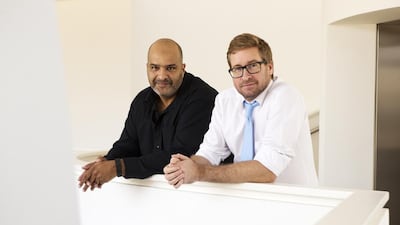DUBAI // Want to know how happy UAE residents are or how people’s moods vary from day to day? Social media holds the answer.
A total of 18 million tweets in English and Arabic sent between January and December last year are being analysed as part of a data research project that aims to gauge the happiness, and unhappiness, levels of residents.
“We have a programme that lets us explore this data,” said Dr Justin Thomas, a psychologist from Zayed University. “We can see which is the most positive Emirate, most negative hour of the day. This will help us do ‘affective forecasting’, allowing us to monitor the emotional pulse of the nation.”
The research is part of the larger culture, cognition and well-being project at the university.
“In the long term, big data will help us understand trends and may even come to be used to assess the impact of policy changes and government initiatives,” said Dr Thomas.
“So far, there are already insights such as Friday being the happiest day for Arabic and English tweets and the most negative posted on Mondays.”
Dr Ian Grey, associate professor in the college of natural and health sciences, said the research is a sign of the times as we live our lives increasingly online.
“No study to date in the UAE has been on this scale. We have access to approximately 60 million pieces of data. “It’s highly novel because with the data, we can track and infer patterns from people’s language online which more than likely reflects current emotional states. This research will potentially help us better understand ways to track societal moods. If, for example, we launch a new initiative aimed at improving well-being then we might be able to use big data as a reliable measure at the national level.”
He said there were no expectations as to what the information or trends the team will reveal.
“We would expect certain days of the week to be happier and perhaps certain hours of the day to be more or less upbeat. We might even expect different patterns between Arabic and English users. We will almost certainly find different geographical differences.”
Tahani Alqahtani graduated from Zayed University in psychology last year and works with Dr Thomas as a part-time research assistant.
“It’s interesting because it’s a novel kind of research. I haven’t seen or read anything like it before. The main research idea is brilliant, since many people are using social media as a way to share and express their thoughts and whatever comes with these thoughts; emotions, moods, and even actions.
“This research would be a great tool for researchers, educators, whoever is interested in the psychological well-being of the nation. It would bring insight into a different dimension of how people choose to use modern technologies to express their feelings.”
Being able to gauge people’s moods on certain days will help the project get an understanding of how the different segments of society spend their time. “So far, we found that Friday is the happiest day. This might be due to the fact it is a holy day where families gather and spend time with each other away from school and work. Similarly, Monday was found to be a negative-tweet day. So it would help to understand more about the people’s moods and thoughts in general.”
In addition, this kind of data could also be used to find out how major events influence people’s opinions and moods, she said.
mswan@thenational.ae

